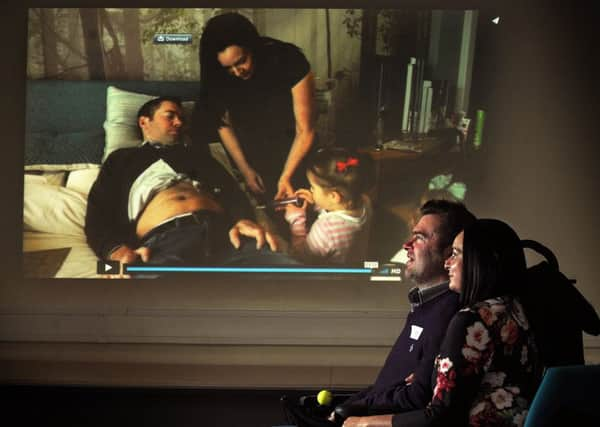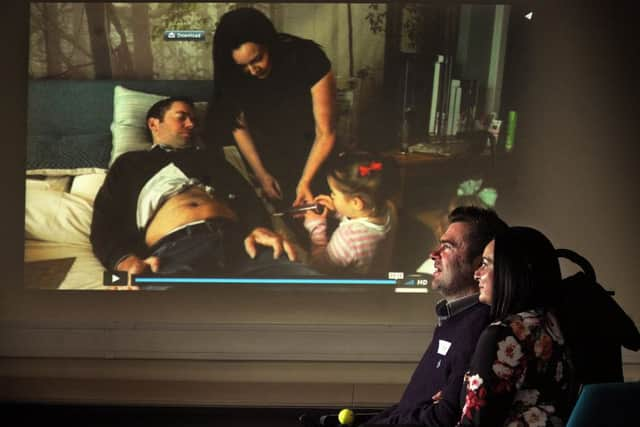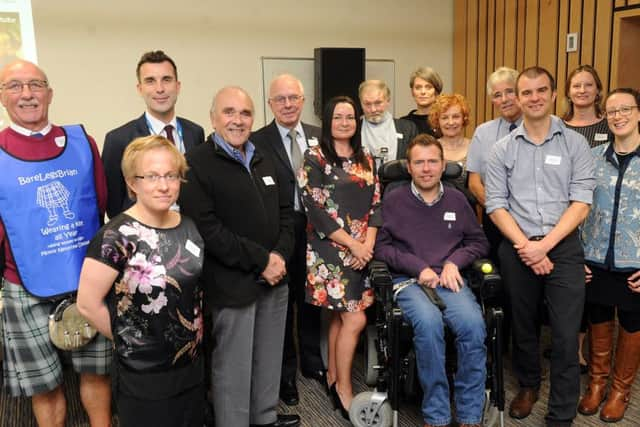Living with the cruelty of Motor Neurone Disease: Brave Yorkshire families share their stories


It is one of the hardest calls for people already dealing with the devastatingly cruel effects of Motor Neurone Disease; choosing whether to have a feeding tube fitted can cause a great deal of heartbreak and anguish for patients and their loved ones.
But while patients have had the additional problem of a lack of information about the process, a new series of videos about the pros and cons of using the tubes has just been created by a group of patients from Yorkshire - and it is already helping people across the world facing the difficult decision.
Advertisement
Hide AdAdvertisement
Hide AdOne of the patients involved in the project, Marlene Leigh, has died since filming took place last year. Her husband Trevor, aged 76 and from Shiregreen in Sheffield, says: “If Marlene would have still been here, she would have been so proud.”


Those involved have shared their personal stories to give a unique insight into the care decisions they have faced. The films have been shared on a web resource called myTube which has been developed by the Sheffield Institute for Translational Neuroscience (SITraN).
The project has been funded by the MND Association, the South Yorkshire MND Association and Westfield Health Charitable Trust.
It went live back in December and has already received positive feedback from as far afield as Australia, where one patient who was deciding on whether to have a feeding tube installed has written to the team to thank them for easing her worries.
Advertisement
Hide AdAdvertisement
Hide AdThe films were officially launched at a special event at the Sheffield Institute, in front of charity volunteers, healthcare professionals, carers and those who participated in the project.


MND is a rapidly progressive neurodegenerative disease which leads to the weakness and wasting of muscles that causes the increasing loss of mobility in the limbs, and difficulties with speech, swallowing and breathing. The disease affects 5,000 adults and kills six people per day in the UK.
As MND progresses it can lead to problems eating. This can result in weight loss, chest infections and even episodes of choking.
Professor Chris McDermott from SITraN says the project came about after national research involving hundreds of MND sufferers and carers revealed that feeding tubes are less effective and more risky to fit when someone’s weight loss is at a more advanced stage.
Advertisement
Hide AdAdvertisement
Hide AdFor patients who had lost more than 10 per cent of their body weight, the results indicated that after three months there was little sign of them gaining any of that back despite having a tube fitted.


“Leaving it late, you don’t get the benefits of weight gain and there is a much greater risk from the procedure. There are increases in potential complications, including death.”
He said after the findings were published in medical journal The Lancet, the team then decided to embark on the video project.
“We wanted to take our research findings and collaborate with people with Motor Neuron Disease and come up with something that could help others. It was evidence-based but integrating it with real life.”
Advertisement
Hide AdAdvertisement
Hide AdIn one of several touching films, Marlene and Trevor are filmed at home talking about their lives together since getting married in 1963; their children, Trevor’s love of fishing and their holidays to Europe - as well as how the disease had affected their lives as Marlene’s condition gradually deteriorated.


It shows how they found their own ways to fight back against the disease, with Marlene using a communication ‘Boogie’ board to write down messages after losing the ability to speak.
Trevor also speaks on the video how they were told during one hospital visit that Marlene would now need a peg, which is a type of feeding tube.
“We didn’t know what it was, had never heard of it and never seen it. They brought this food and the first thing she said was when she saw it was it looked like a drink of Baileys, she said they’re going to feed me that, that’ll be alright!
Advertisement
Hide AdAdvertisement
Hide Ad“When she came home, the district nurse taught me how to set it up and do it. It is dead easy when you have seen it done a few times. There is nothing to it.”
Among those who also share their stories in the videos are Jason Liversidge and his wife Liz, who are from Rise near Skirlaugh in East Yorkshire. They feature in them with their two daughters Lilly and Poppy.
After being diagnosed with MND in 2013 at the age of 37, Jason found mealtimes became very stressful and he began rapidly losing weight. Liz says that for the pair of them it was a relatively simple decision to have the feeding tube fitted after Jason’s weight fell dramatically.
“If he hadn’t had it fitted, he wouldn’t be here today. He was down to eight-and-a-half stone. In Jason’s case he was able to put all the weight he had lost back on and is still here because of that.”
Advertisement
Hide AdAdvertisement
Hide AdJason explains: “It was a bit of a shock to start with having a tube fitted, but I think it took me about a couple of days to come round to the idea. It is more a mental thing of knowing you’re going to have a hole in your stomach. But once you’ve got it, you don’t know it is there – it doesn’t interfere in your life. It is a bit of a no-brainer.”
But those involved in the project also wanted to make sure they included the perspective of those whose loved ones decided not to have a feeding tube fitted.
Brian Jackson, aged 74 and from Greenhill in Sheffield, lost his wife Chris to the condition in 2012, when she was aged 67. He says: “Part of my life is to make sure as many people know about Motor Neurone Disease as possible. This resource is absolutely wonderful.
“Chris made the decision immediately that she wasn’t going to have any invasive procedures at all. She made her mind she wouldn’t have the tube. It was very important for that view to be put forward so people know both sides of the argument.”
Advertisement
Hide AdAdvertisement
Hide AdIn his video, Brian says: “In her mind having invasive procedures of any description was prolonging life. Our faith is Christian and we know what is going to happen after death and there is no point in prolonging it. Everybody was very supportive and what was put forward was you can change your mind should we wish to. But they respected Chris’ decision.”
Chris eventually became unable to eat and in the final week of her life stayed in bed while Brian cared for her. “She just went away, got weaker and weaker and weaker until the end came one night,” he says.
MND is currently incurable but Professor McDermott says there are growing hopes a cure could be on the horizon. “There is some light at the end of the tunnel. We are a lot nearer a breakthrough than we ever have been. But we have to remember the patients living with MND now and make sure we do the best for them.”
Feeding tube ‘not the end of eating’
Patients who have feeding tubes fitted are still able to eat in most cases.
Advertisement
Hide AdAdvertisement
Hide AdProfessor McDermott says: “People can continue to eat regardless of whether a feeding tube is in place as long as it is safe for them to do so and they continue to enjoy eating.
“People quite naturally are apprehensive or fearful of things they don’t understand, particularly if there is an operation involved. It is about giving accurate information, giving patient’s time to reflect on the information and ask questions.
“One of the purposes of putting this website together is to help support people in making those decisions.”
To view the videos, visit http://mytube.mymnd.org.uk.